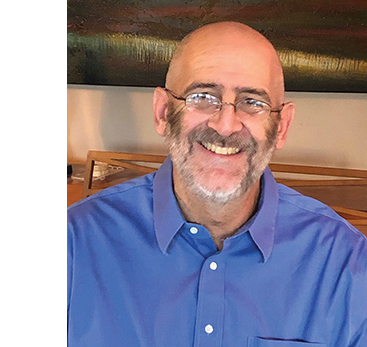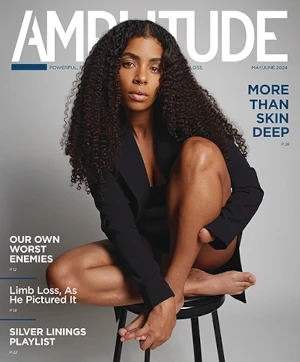Having never experienced limb loss myself, I routinely stumble over my own limitations on the subject.

Thanks to the patience of many teachers—not only amputees but also prosthetists, surgeons, and others in the limb-loss community—and my bottomless curiosity as an interviewer, I’m constantly chipping away at the gaps in my understanding.
But those gaps will always be great. Indeed, the more I learn about limb loss, the larger my blind spots seem to be. As Julia Layton puts it in “Stroll Survivor,” her feature about learning to walk on a prosthesis: “You don’t know what you don’t know.”
The happy corollary, of course, is that there’s always something new to discover —another body of knowledge, a deeper layer of meaning. In Layton’s case, she came to recognize the beauty of one aspect of her humanity that she’s always taken for granted: bipedalism. Simply putting one foot in front of the other turns out to be an incredibly complex, intricate dance. But Layton couldn’t gain that perspective until she tried walking like a lower-limb amputee, using a bent-knee device that’s designed specifically to educate us uninitiated two-leggers. As she describes it: “Learning to walk with a prosthetic leg was like looking up ‘walk’ [in the dictionary] and finding out I might have been using [the word] wrong all along.”
In another of this edition’s features (“Coach Me if I Fall”), we follow recent amputee Elayna Alexandra on a longer, more profound journey of self-discovery. She reached her late 30s before recognizing how her lifelong limb difference (congenital pseudoarthrosis) had affected her sense of identity, career arc, and personal relationships—and not always in the healthiest ways. Choosing to amputate at age 37 was, in a sense, a rebirth for Alexandra. She had to re-learn not only how to walk but how to know herself.
“One of the big pieces I learned . . . is to drop down into my body—which, for pretty much my entire life, I didn’t really want to be in,” she told Amplitude. “I made a choice to truly connect to my body and understand what it was going through. I opened myself up to this whole new story that allowed me to really feel my experience.”
Alexandra, who’s now in practice as an ontological life coach, has become an expert in guiding individuals toward life-changing moments of self-recognition—and helping them chart a new path forward. Read her story and find out how life coaching differs from (and overlaps with) conventional psychotherapy.
It’s my hope that every issue of Amplitude will open new windows and spark new ideas about living with limb loss. To accomplish that, I’ll always rely on (and be grateful for) the insights and knowledge of everyone in the limb-loss community.




